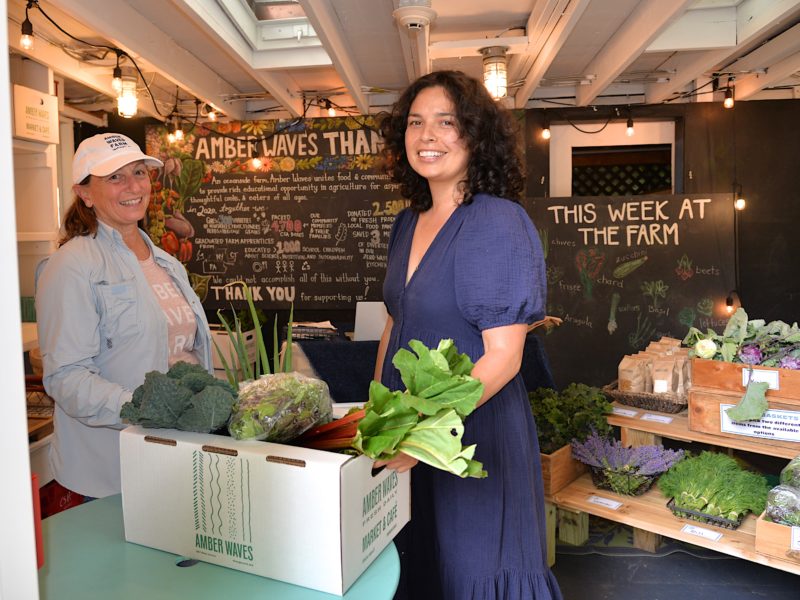
An innovator in agriculture, the East End is home to the slow food movement’s latest trend: highly personalized farm shares.
Across the United States, farm shares or community-supported agriculture or CSA programs are booming thanks to the pandemic. CSAs forge a relationship between the American consumer and the farmer, with customers generally paying a lump sum for produce in the spring and then receiving their weekly farm share as the season progresses. Customers share in the farm’s risk, as they receive the weekly bounty based on what’s growing, not necessarily what they want to eat. Some summers that could mean buckets of cherry tomatoes, while others you could get loads of lettuce.
And now, after a year and a half of grocery store shortages and being locked at home, CSAs are going highly personal, especially on the South Fork. Instead of only vegetables, customers can do bread or meat add-ons, with the farm sourcing goods from other like-minded businesses. For the consumer, this means a curated box and that the farm is one step closer to the grocery store.
Across the South Fork, farms like Balsam Farms and Amber Waves are leading the way in this new sustainable food trend.
Amber Waves began its CSA with vegetables and two baguettes “whether you wanted it or not,” recalled co-founder Amanda Merrow with a laugh. The farm, a pioneer in the slow food movement, was initially conceptualized as a pizza farm and grew its own wheat. Carissa — the baker who went on to found East Hampton favorite Carissa’s Bakery — would bake using Amber Waves’ South Fork wheat. It seemed like a natural addition to add baguettes to the farm share.
Now, 13 years later, Amber Waves operates one of the most popular farm shares on the East End. Ms. Merrow sees the share add-ons as a way to introduce loyal customers to other brands and farms that approach food with a similar mindset.
“Let’s bring our friends along,” said Ms. Merrow, who is more than happy to share the success of the farm with other like-minded producers. “It is also fun for us to do the pairings. What bread and cheese and fruit will you have for us this week?”
As the modern consumer is faced with more choice than ever before, Ms. Merrow sees the farm share as a way of simplifying one’s life. Customers can indicate if they eat dairy, meat or gluten, and then from there pick up their weekly grocery shop.
Right now Amber Waves offers a bread add-on with Newlight Breadworks; a cheese add-on with Bridgehampton’s Mecox Bay Dairy and Goodale Farms in Riverhead; a fruit add-on with Riverhead’s Briermere Farms and Milk Pail in Water Mill; a pasta add-on with L’Acquolina Pasta; a beef add-on with Acabonac Farms in East Hampton and then a flower as well as seedling add-on from its own farm.
In addition to the customers’ benefit, offering share add-ons like cheese or meat is a boon for other small-scale producers.
For Acabonac Farms, an East Hampton grass-fed beef operator, the connection with farms like Amber Waves or Sep’s on the North Fork means that more of the animal is used.
“What it allows us to do is move the entire animal,” Acabonac Farms owner Stephen Skrenta said. “During the summer everybody wants ribeyes and strip steaks. That is great but there is only so many of those on every animal. What about the ground beef and sirloin steaks and the short ribs and brisket?”
Mr. Skrenta estimates that around 25 percent of the cow is used for premium cuts like rib eye or skirt steak, while 25 percent are what he considers value cuts that require more work in the kitchen, like brisket. The other 50 percent of the cow is used for ground beef, or one of the farm’s newer products — a nitrate-free 100 percent beef hotdog.
“If you can’t sell that 50 percent of ground beef, then you have to stop your production,” Mr. Skrenta explained. “Partnering with all these farms, which is only part of our business, allows us to move more ground beef.”
In addition to Amber Waves, Acabonac Farms offers a meat share at Balsam Farms in Amagansett, HOG Farm in Brookhaven and Sep’s Farms in East Marion. Part of the reason that Acabonac Farms has been able to partner with so many farms since its first full season in 2016 is that Mr. Skrenta designed his meat share business to fit a busy vegetable farm’s needs. All beef shares are delivered in an insulated, environmentally friendly container with dry ice a day before the share is distributed.
“All Amber Waves has to do is take out our box, take out the beef share and hand it to a customer,” Mr. Skrenta explained. “They don’t have to deploy any refrigeration or deploy any labor to hand it out.”
As for customers, they are loving this new curated approach to grocery shopping.
“It is a nice way to say, ‘Look, this is a sustainable way to get your food,’” said Bella Fantini, who is in her second year of farm shares with Amber Waves. “You don’t have to go to Stop & Shop.”